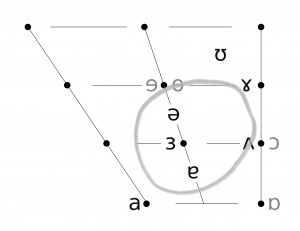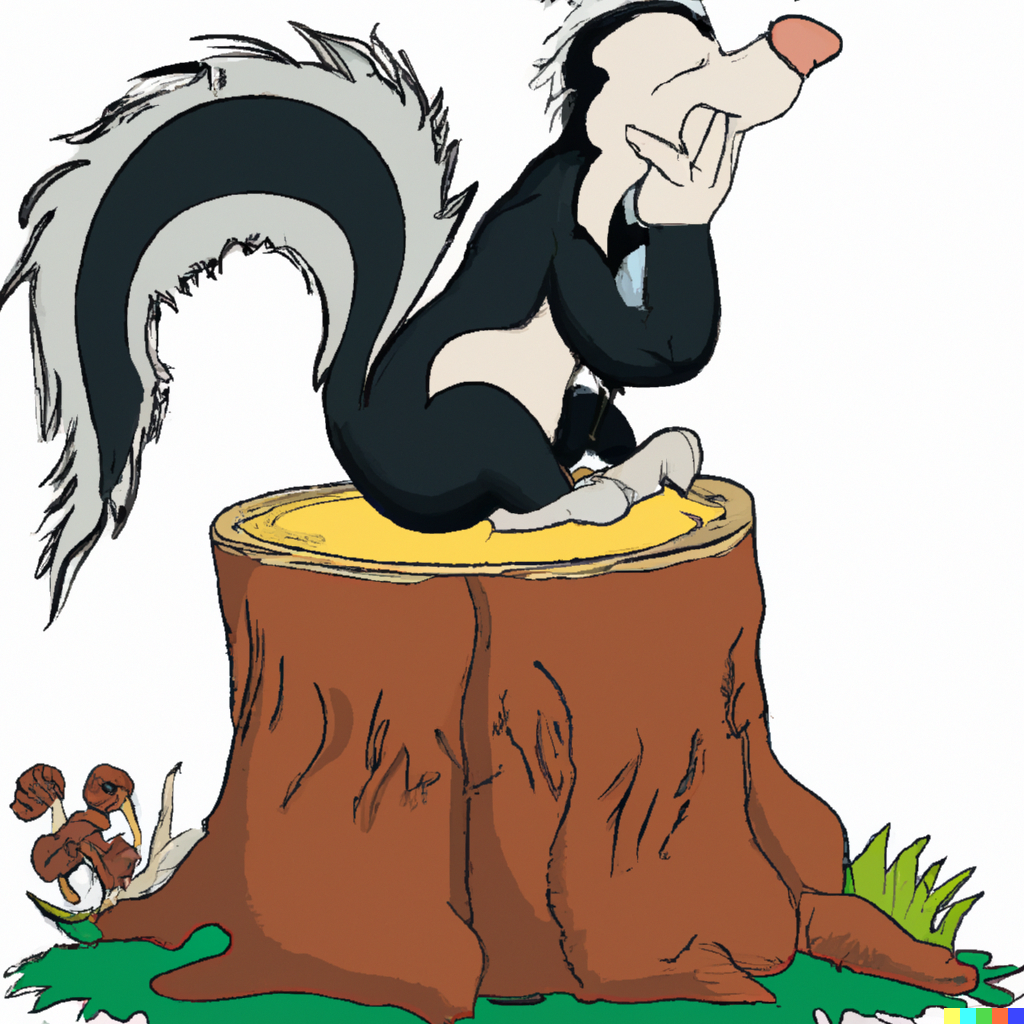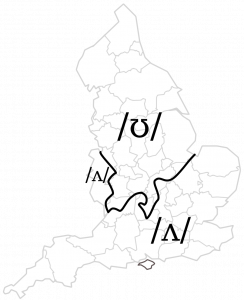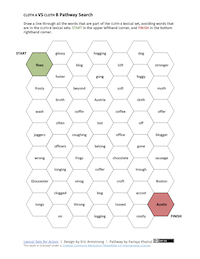5 The STRUT Lexical Set
 The strut lexical set is a part of the Checked vowels group, and is capable of being in stressed syllables, and in some accents, in some unstressed syllables as well. However, some accents have little difference, apart from stress, between strut and comma, and in those cases, strut is typically considered the stressed form of comma. Traditionally, strut is known as the “Short U” vowel. Historically, most of the words in strut evolved from the short /u/ vowel, though a small number of strut words (usually spelled ‹oo› or ‹ou›) evolved from /o/. As such, strut words and foot words Split into two lexical sets in the 17th century. In the North of England, where the split didn’t take place or may be incomplete, what appears to be a merger of foot/strut is actually just the pre-existing condition (i.e. all strut words used to sound like foot words before the split!)
The strut lexical set is a part of the Checked vowels group, and is capable of being in stressed syllables, and in some accents, in some unstressed syllables as well. However, some accents have little difference, apart from stress, between strut and comma, and in those cases, strut is typically considered the stressed form of comma. Traditionally, strut is known as the “Short U” vowel. Historically, most of the words in strut evolved from the short /u/ vowel, though a small number of strut words (usually spelled ‹oo› or ‹ou›) evolved from /o/. As such, strut words and foot words Split into two lexical sets in the 17th century. In the North of England, where the split didn’t take place or may be incomplete, what appears to be a merger of foot/strut is actually just the pre-existing condition (i.e. all strut words used to sound like foot words before the split!)
In many varieties of English today, strut is a mid-open vowel ranging from central to back [ɐ ~ ʌ̟ ~ ʌ̠ ~ ɒ̝], with its most different pronunciations ranging from [a] in Cockney, to a mid-open central vowel [ɜ] in parts of the US South, to a unrounded mid-close back vowel [ɤ̟̈] in parts of the North of England.
- ☑️ Checked: requires a following consonant, and cannot exist on its own
- in both stressed and unstressed syllables
Spellings
uC, oCe, oC, ouC, ood
Many words within the strut set are spelled “u” before a consonant (C), or ‹uC› as in cut, bun, husk. Examples in stressed syllables include: such, above, does, flood, undone, enough; examples of words with strut in unstressed syllables include: product, anyone, income, lifeblood, thermocouple.
Pronunciations
In discussing pronunciations of strut, we’ll assume that we’re considering the split version that is differentiated from foot. The strut lexical set is often transcribed with the /ʌ/ symbol, especially in broad transcriptions as found in dictionaries, and that symbol and the vowel of the strut lexical set are of known as wedge, caret, hat or hut (which is my personal preference!). However, the vowel quality of many varieties is quite different from the strict IPA definition of ʌ, which is an open-mid back unrounded vowel [ʌ] that is actually fairly rare. In describing the possibilities of strut, I will use narrow transcription to try to give a more detailed view of how strut might be pronounced.
For many varieties of English, strut is a bit more open, and a bit more forward than the back of the mouth, and so an advanced [ʌ̟] is more appropriate. A second group features some kind of central vowel, either a more mid-central version around [ɜ ~ ə], or a more open version around [ɐ]. The Cockney version, which is more fronted, [a], might be thought of as an extreme of this type. There is a more backed version (in spite of my comments above), with either a rounded [ɔ] or unrounded version [ʌ̠]. And of course, there are those pronunciations merged with foot, usually somewhere around [ʊ], which follow the pronunciation you’ll find in that chapter (The foot Lexical Set).
Personal Pronunciation
Let’s figure out your personal way of saying strut. First, let’s determine whether your strut and foot sets are merged, or whether your accent has split them into two sets. Compare these minimal pairs: putt/put, cud/could, stud/stood, buck/book, luck/look. Are they the same, or different? (Note that for some speakers, the last two could be a different kind of contrast, if generally strut and foot match, but words like book, look, shook, took are pronounced with the goose vowel.) If they are the same, exploring strut with a different, contrasting vowel will be a new experience; if strut and foot are different, you might occasionally experiment with applying your foot vowel to some of the word lists, phrases and sentences to see how that sounds and feels.
Experiment on your own or with a classmate, friend, coach or teacher to identify how your strut vowel compares with others. Try lengthening the sound of your strut vowel, and then attempt to subtly shift its articulation around in the vowel space of your mouth—up, forwards, down, and back—in tiny increments. You should feel the top surface of your tongue arching/cupping towards/away from your alveolar (gum) ridge behind your upper front teeth. What’s the smallest noticeable change that you can make?
If your strut vowel is
- high, use the raised diacritic [ ɐ̝ ], a small T pointing up
- open, use the lowered diacritic [ ɐ̞ ], a small T pointing down
- pushed forward, use the advanced diacritic [ ɐ̟ ], a tiny plus sign +
- pulled back, use the retracted diacritic [ ɐ̠ ], a tiny minus sign –
- moved toward the middle of the mouth, towards schwa [ə], use the mid-centralized diacritic [ ʌ̽ ], a tiny x-marks-the-spot above the symbol,
- if you add lip-rounding, use the more rounded diacritic [ ʌ̹ ], a tiny ɔ, which represents the lips rounding forward (to the left).
Alternate Pronunciations
Experiment with the Word Lists, Phrases and Sentences with the following vowels:
As you change the articulation of the vowels’ qualities in the directions recommended, see whether that modified oral posture might inspire you to move the articulation of consonants and other vowels in the word in similar, subtle ways. Does it remind you of another accent?
Word Lists for strut, sorted by the consonant that follows
KEY: ◾︎strut in stressed syllable ◽︎strut in unstressed syllable
PLOSIVES
-p
-b
-t
-d
-k
-ɡ
AFFRICATES
-tʃ
-dʒ
NASALS
-m
-n
-ŋ
T-junction, conjunctiva, Podunk, truncate, countersunk, chipmunk, Austro-Hungarian, adjunct, ungoverned, punch-drunk, languages, aqualung, carbuncle, furuncle, smooth-tongued, coalbunker, punctiliously, unpunctuality, punctuate, punctate, hamstrung, adjunct
FRICATIVES
-θ
-ð
words with –brother: half-brother, Fairbrother, stepbrother, foster-brother;
-f
-v
-s
must-have, suspect, bus, trusted, discuss, thus, bust=bused, muscle, robust, trusts, customization, suspect, custody, customs, justify, Brussels
-z
-ʃ
-ʒ
APPROXIMANTS
Vowels followed by /l/ often are affected by the “darkness,” or velarization of that /l/, which often may pull back, especially if /l/ is articulated with a particularly dark-l [ɫ]. In fact, in some accents, the dark-l may be so “strong” that the vowel disappears and the consonant /l/ becomes syllabic, that is, the /l/ replaces the vowel, and the length of the syllable is filled entirely by the sustained consonant [ɫ̩]. So a word like “gull” /ɡʌɫ/ becomes [ɡɫ̩]. See the hull-pull merger, below.
 In order to practice this vowel without the following dark-l affecting it, let’s use the “Consonant Chop” technique. Speak the word without the following /ɫ/ and anything that comes after it, chopping the word off right after the strut vowel. For example, for bulk, you would start by saying “bu-“ then, as two units, say “bu- -lk,” being sure to use a somewhat lighter /ɫ/ if you can. If you’re working on using the [ɐ] vowel, that would be [bɐ—ɫk]. Then try putting the two syllables closer and closer together, [bɐ – ɫk, bɐ -ɫk, bɐ.ɫk, ˈbɐɫk]. Now try a different word, pulp, and a different vowel, say [ɒ̟], and change the /ɫ/ to a clear/light-l [l] [pɒ̟ – lp, pɒ̟ -lp, pɒ̟.lp, ˈpɒ̟lp]. If you have success with that more extreme oral gesture, then you can attempt the more backed (and more challenging!) [ʌ̠ɫ] version afterwards.
In order to practice this vowel without the following dark-l affecting it, let’s use the “Consonant Chop” technique. Speak the word without the following /ɫ/ and anything that comes after it, chopping the word off right after the strut vowel. For example, for bulk, you would start by saying “bu-“ then, as two units, say “bu- -lk,” being sure to use a somewhat lighter /ɫ/ if you can. If you’re working on using the [ɐ] vowel, that would be [bɐ—ɫk]. Then try putting the two syllables closer and closer together, [bɐ – ɫk, bɐ -ɫk, bɐ.ɫk, ˈbɐɫk]. Now try a different word, pulp, and a different vowel, say [ɒ̟], and change the /ɫ/ to a clear/light-l [l] [pɒ̟ – lp, pɒ̟ -lp, pɒ̟.lp, ˈpɒ̟lp]. If you have success with that more extreme oral gesture, then you can attempt the more backed (and more challenging!) [ʌ̠ɫ] version afterwards.
-l/ɫ
-ɹ*(see nurse)
Short Phrases
- Shut the fuck up!
- What* wonderful luck!
- Fun in the sun
- Some fun summer lovin’.
- Percussionists love the drums.
- Umbrella weather in London.
- The Hungarian ski-jumper tumbled.
- A peanut, coconut, and fudge donut.
- The skunk stunk up the stump.
- An unlovable fussbudget.
- Dunk your bun in the mushroom soup.
- Ms. McGovern summed one hundred numbers.
- Multi-colored scrunch-butt leggings.
- The ultimate rum punch.
- Lucky son of a gun.

Sentences
Level 1
Short with 2-3 words, underlined
- Can we trust that justice will be served?
- Their brother cleaned the oven on Monday.
- The Cuthberts love Anne unequivocally.
- She doesn’t have to double-clutch in her new car.
- Get me a hazelnut latte at Starbucks, honey.
Level 2
Short with 4-5 words, underlined
- She insulted my husband by calling him an uncultured swine.
- The Mustang and the 4Runner touched bumpers.
- Get some bubblegum with your fun money.
- The pub is in Up Mudford, Somerset.
- The Duchess put up with the hustle and bustle of the city.
Level 3
Medium with 3-4 words, not underlined
- Someone dunked Gus’s toothbrush in the toilet.
- The instructor set up the touchscreen.
- The pop-up dress shop went bankrupt last month.
- Lord Douglas travelled to Dublin with his butler.
- Dutch got drunk on cheap rotgut.
Level 4
Hard with 4-6 words, not underlined
- The publisher doubled the stand-up’s income.
- Taxes are the lifeblood of government, so we need funding to avoid shutdowns.
- The understudy scrubbed her make-up off with a cleanser made from honeysuckle.
- My cousin and my uncle cuddled our new puppy, Dudley.
- Corrupt puppet masters use legal structures to hide stolen money.
Mergers
strut-comma Merger: For Welsh and Northern English accents of English, strut and comma share the vowel [ə], though strut is generally considered to be the stressed version of the vowel, and comma is the unstressed one. For example, an acceptable choice and unacceptable choice would be minimal pairs, and seagull and eagle rhyme. Likewise, in some variants of North American English, strut and comma may share a vowel [ɐ ~ ʌ̟] in certain contexts, again with the difference between the sets being merely one of stress. Above, abundance, and another may have the same vowel quality if you have this merger, though not the same degree of stress, especially in their dictionary forms. If you have distinct strut and comma, try making them match in the sentences below; if they match for you, then try to split them using [ʌ̠] for strut and [ə] for comma.
-
- Come now, commit to saying that a cow cadaver couldn’t chew its cud.
- Illustrate the lustre in his lascivious, lusty eyes.
- Despite all the frustrating previous attempts, I’m determined to get that mushroom plush from the claw machine.
- Alva became a government official after discovering her love in political affairs.
- They sent out an alert before the sudden flood and gave us the advantage to run to higher ground.
nurse–strut before /r/ or Furry-Hurry Merger: Most accents in North America feature this merger (also known as the Second nurse Merger) so that words like hurry, worry, Surrey rhyme with furry, blurry, generally pronounced with [ɝ] or a variant thereof. Note how you can distinguish the morpheme of “fur” or “blur” as separate nurse words, while “hurry” is a complete word: this helps those with this merger to assess how a word like “current” or “currish” might be said in an accent that lacks the merger. “Current” is indivisible, and so it can be [ˈkʌɹənt], while “currish” has the root word “curr” (
-
- I’m worried that my blurry eyes can’t spot the furry bunnies’ burrows.
- The current headmaster gave me a referral to an entrepreneurial apprenticeship in Surrey.
- Furry creatures need nourishment to flourish and show love by purring.
- Chin had recurring blurriness after his flight and was worried about his current situation.
The strut before /r/-dress before /r/ or Murray-Merry merger, as heard in Philadelphia, merges words with ‹er› like merry, very, terrible, ceremony which are dress+r, with words like Murray, which are strut+r, with a vowel quality around [ʌ̟]. Example of minimal pairs include: Kerry/curry, merry/Murray, wary/worry. Try these out: for those who already merge them, try to make them distinct with your dress vowel for the words spelled ‹er›, and either your strut or nurse vowel for the strut+r words. If you make the two sets distinct already, experiment with merging them with a somewhat backed strut vowel, [ʌ̟]..
-
- Jeremy verified that worrying was a thoroughly American kind of merriment
- The current issue is very necessary to solve before we can worry about anything else.
- Ceremonies celebrating heritage are quite the common occurrence in Edinburgh.
- I have to check for errors thoroughly before I have the courage to hand in this very important essay.
The strut+l-goal (goat+l) or Hull-Hole merger only occurs in accents where the final /l/ is vocalized (usually somewhere around [o ~ ɤ]), which occurs in many accents in England, though there is evidence that similar mergers are occurring in the South of the US. The merged vowel lies somewhere around [ɔʊ̯]. Minimal pairs for strut+l–goal include: cult/colt, null/knoll, dull/dole, mulled/mold, cull/coal, hulled/hold, etc. If you have two distinct sets here, try making them merged with [ɔʊ̯]; if they’re merged for you, experiment with a bright, forward vowel like [ɐu̯] for strut+l and make goal contrast with a more close variant, such as [oɤ̯].
-
- The gull got its goal when it pulled the food out of the hole in the hull.
- Nolan had a culture shock when he moved to Poland on an impulse.
- I was out on a stroll, then I bolted to the store when I saw they had a bulk sale for orange juice with pulp.
- After her friend stole her golden bracelet, Samira was ultimately very vulnerable.
The strut-foot before /l/ or Hull-Pull merger is where both sets essentially reduce their vowel, through the use of a syllabic dark-l, thereby creating a merging the two sets. This only occurs in unstressed syllables, or in accents where a syllabic-l is acceptable in a stressed syllable. Muller/Mueller (and mullah/Mueller in non-rhotic accents) is the only minimal pair. Rhymes include hull, cull, null, dull, mull/pull, full, wool, bull. In unstressed final syllables, these also rhyme with syllabic-l as a result of the reduction of schwa, so Segal=seagull/eagle is a near rhyme. If you have this feature, try focusing on your strut and foot vowels while trying to lighten/clarify your postvocalic /l/ somewhat. If this merger is new to you, try having a dark-l “swallow” the vowels of those sets so all you hear is the syllabic [ɫ̩].
-
- The bulk of the hulking bull pulled my full attention from the bump on his skull.
- I was excited for an ultimate culture tour of Istanbul, Turkey, but it was full.
- I spent months sculpting a statue of a werewolf to pull the attention of multiple media outlets.
- The farmer was about to cull the bull but ultimately couldn’t, because he pulled a muscle.
Splits
 foot-strut Split: As explained in the introduction to this chapter, the strut Lexical Set derived from historical short /u/ and some /o/ words which merged to make a new group of words that include all of foot and strut. What became those two separate sets initially all shared the [ʊ] vowel. Accents in the North of England feature this still-merged situation. Accents elsewhere, where foot and strut are distinguished from one another, have undergone the Split.
foot-strut Split: As explained in the introduction to this chapter, the strut Lexical Set derived from historical short /u/ and some /o/ words which merged to make a new group of words that include all of foot and strut. What became those two separate sets initially all shared the [ʊ] vowel. Accents in the North of England feature this still-merged situation. Accents elsewhere, where foot and strut are distinguished from one another, have undergone the Split.
The foot–strut Split began to happen in English in the 17th century after the Great Vowel Shift merged /o/ and /u/ into long and short /u/. Over time, words gradually shifted—after many adjustments—to /ʊ/ and /ʌ/. The split separated words like could/cud, put/putt, book/buck, took/tuck, oops/ups, Jung/young, puss/pus, look/luck*, cook/cuck*, shook/shuck*. However, in many accents, especially in the North of England, this split didn’t happen, and so these words resolved themselves as the foot vowel.
*Note that some Northern English accents have foot + /k/ merged with goose, so though the strut word will have [ʊ], the foot word will be [u].
If foot and strut are split in your accent, try saying the pairs of words above with [ʊ]. If they are still merged in your accent, try to differentiate the words in the list above and in the sentence below, and explore foot/strut with the following possible pairs; [ʊ/ʌ, ʊ̜/ɐ, ɵ̜/ʌ̠, u̠/a, ʊə]
What luck: it looks like the book only cost young Dr. Jung five bucks.
Oops-a-daisy! After my putt, I took up the ball and put it away, and tucked it in my pocket.
Review
Pathway Puzzles
 Pathway Puzzles allow you to practice finding members of a lexical set. Choose the next cell with the FIRST lexical set word to make a pathway from the START of the puzzle down to the FINISH. Open the KEY document to see the solution, and check your work. Pathway Puzzles were created by Farisya Khairul, through support from a AMPD Minor Research Grant.
Pathway Puzzles allow you to practice finding members of a lexical set. Choose the next cell with the FIRST lexical set word to make a pathway from the START of the puzzle down to the FINISH. Open the KEY document to see the solution, and check your work. Pathway Puzzles were created by Farisya Khairul, through support from a AMPD Minor Research Grant.
A historical process whereby one phoneme (or lexical set) subdivides into two or more phonemes/ lexical sets.

